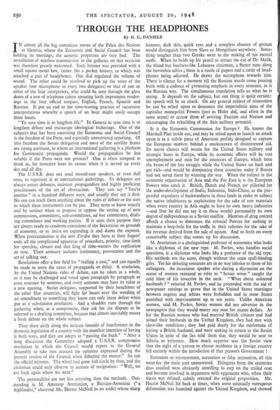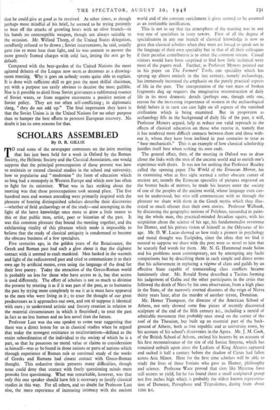THROUGH THE HEADPHONES
By H. G. DANIELS N almost all the big committee rooms of the Palais des Nations at Geneva, where the Economic and Social Council has been holding its meetings, the acoustic properties are very bad. The installation of wireless transmission to the galleries on this occasion was therefore greatly welcomed. Each listener was provided with a small square metal box, rather like a pocket battery, to which was attached a pair of headphones. One dial regulated the volume of sound. The other could be revolved to pick up the voice of the speaker (one microphone to every two delegates) or that of one or other of the four interpreters, who could be seen through the glass doors of a row of telephone cabins spouting forth impromptu render- ings in the four official tongues, English, French, Spanish and Russian. It put an end to the time-wasting practice of successive interpretations whereby a speech of an hour might easily -occupy three hours.
"To save time is to lengthen life." In Geneva to save time is to lengthen debate and encourage ideological bickerings. One of the subjects that has been exercising the Economic and Social Council is the freedom of the Press, and especially unrestricted reporting. Of this freedom the Soviet delegation and most of the satellite States are strong partisans, to whom an international gathering is a platform for Communist propaganda. Would the propagandists be less voluble if the Press were not present? One is often tempted to think so, for invective loses its savour when it is served up every day and all day.
The U.S.S.R. does not send second-rate speakers, or even dull ones, to represent it at international gatherings. Its delegates are always astute debaters, insistent propagandists and highly proficient practitioners of the art of obstruction. They can say "You're another" in a hundred different ways, and usually they say it first. No one can teach them anything about the rules of debate or the uses to which these instruments can be put. They seem to know exactly and by instinct when to propose or oppose the setting up of new commissions, committees, sub-committees, ad hoc committees, draft- ing committees and working parties. If it suits their purpose they are always ready to condemn extensions of the Secretariat on grounds of economy, or to insist on expanding it and damn the expense. When procrastination is the mot d'ordre they have at their fingers' ends all the complicated apparatus of procedure, priority, time-limit for speeches, closure and that king of time-wasters the explication de vote. Their armoury includes irrelevancy, provocation and the art of talking out.
Resolutions offer a fine field for "trailing a coat," and can equally be made to serve the cause of propaganda or delay. A resolution, by the United Nations rules of debate, can be taken as a whole, or it may be challenged and voted upon paragraph by paragraph or even sentence by sentence, and every sentence may have its value as a new opening. Soviet delegates, supported by their henchmen of the other Slav countries, will fight fpr hours over the wording of an amendment to something they know can only incur defeat when put as a substantive resolution. And a shudder runs through the gathering when, as a compromise, they ask for the dispute to be referred to a drafting committee, because that almost inevitably means - a fresh debate on the whole subject.
They skate airily along the delicate frontier of interference in the domestic legislation of a country with the manifest intention of having it both ways, and they are adepts at "passing the buck." "After a long discussion the Committee adopted a U.S.S.R. compromise resolution in which the Council would report to the General Assembly to take into account the opinions expressed during the present session of the Council when debating the matter." So ran the official minutes. The wheel had gone full circle by then, and the chairman could only observe in accents of resignation: "Well, we are back again where we were."
The personalities are not less arresting than the methods. Out- standing is M. Amazasp Arutiunian, a Russian-Armenian C a highlander," observed Mx. Hector McNeil in an aside) whose sharp
features, dark skin, quick eyes and a complete absence of gesture would distinguish him from Slays or Mongolians anywhere. Some- thing tougher than two Greeks went to the making of his mental outfit. When he holds up his pencil to attract the eye of Dr. Malik, the bland but business-like Lebanese chairman, a flutter runs along the horseshoe tables ; there is a rustle of papers and a rattle of head- phones being adjusted. He draws the microphone towards him. There is silence for a moment till the Russian words come pouring forth with a cadence of protesting emphasis in every sentence, as is the Russian way. The simultaneous translation tells us what he is siying. It depends on the subject, but one thing is quite certain: his speech will be an attack. On any general subject of restoration he can be relied upon to denounce the imperialistic aims of the capitalist monopolist Powers (just as Hitler did, and often in the same terms) or accuse them of reviving Fascism and Nazism and encouraging the rebuilding of the Axis military potential.
Is it the Economic Commission for Europe ? He knows the Marshall Plan inside out, and may be relied upon to launch an attack upon it as a subtle piece of American perfidy designed to capture the European markets behind a smokescreen of disinterested aid. Its secret clauses will secure for the United States military and strategic bases in Europe, while its economic effects will be vast unemployment and ruin for the countries of Europe, which bore the brunt of the late struggle while the United States sat back and got rich—and would be dominating those countries today if Russia had not saved them by winning the war. When the subject is the economic organisation of Asia and the Far East it is the European Powers who catch it. British, Dutch and French are pilloried for the under-development of India, Indonesia, Indo-China, as the pur- poseful organisers of backwardness in these lands in order to subject the native inhabitants to exploitation for the sake of raw materials when every country in Asia ought to have its own heavy industries —and (but he did not say it in these words) presumably its own degree of independence as a Soviet satellite. Mention of drug control affords a chance to denounce the colonial Powers for seeking to maintain a loop-hole for the traffic in their colonies for the sake of the revenue derived from the sale of opium. And so forth on every conceivable subject that comes up for discussion.
M. Arutiunian is a distinguished professor of economics who looks like a diplomat of the new type. M. Pavlov, who handles social questions, is a diplomat who looks like a professor of the old type. His methods are the same, though without the same spell-binding gifts. Yet his debating resources are in no way inferior to those of his colleagues. An incautious speaker who during a discussion on the status of women ventured to refer to "Soviet wives" caught the cold blast of his invective in the neck. "What about coloured husbands ? " retorted M. Pavlov, and he proceeded with the aid of newspaper cuttings to prove that in the United States marriages between negroes and whites were forbidden and in some States punished with imprisonment up to ten years. Unlike American women, said M. Pavlov, Soviet women did not advertise in the newspapers that they would marry any man for to,000 dollars. As for the Russian women who had married British citizens and had joined their husbands in the United Kingdom, they had met with slave-like conditions ; they had paid dearly for the misfortune of having a British husband, and were seeking to return to the Soviet Union in spite of the lies told them that they would be sent to Siberia as prisoners. How much superior was the Soviet view that the right of a person to choose kesidence in a foreign country fell entirely within the jurisdiction of that person's Government !
Statement or misstatement, accusation or false accusation, all this went for the main part unanswered. Delegates from the countries thus assailed were obviously unwilling to step on the trailed coat and become involved in arguments with opponents whO, when their thesis was refuted, calmly restated the original proposition. Mr. Hector McNeil hit back at times, when some unusually outrageous defamation was launched against the United Kingdom, and showed
that he could give as good as he received. At other times, as though perhaps more mindful of his brief, he seemed to be trying patiently to beat off the attacks of growling bears with an olive (branch—in his hands no contemptible weapon, though not always suitable to the occasion. Mr. Willard Thorp, of the United States delegation, steadfastly refused to be drawn ; Soviet interventions, he said, usually gave rise to more heat than light, and he was content to answer the more grossly framed charges with cold fact, letting the rest go by default.
Compared with the bear-garden of the United Nations the more agitated debates of the League now seem as decorous as a drawing- room meeting. Why it goes on nobody seems quite able to explain. It is done with sufficient skill to get past the most skilful chairman, yet with a purpose too easily obvious to deceive the most gullible. Nor is it possible to distil from Soviet grievances a sublimated essence of Soviet wants, or from negative statements a positive notion of Soviet policy. They are too often self-conflicting ; in diplomatic slang, "they do not add up." The final impression they leave is that the Soviet Union is in the United Nations for no other purpose than to hamper the best efforts to promote European recovery. No doubt it has its own reasons for that.



































 Previous page
Previous page